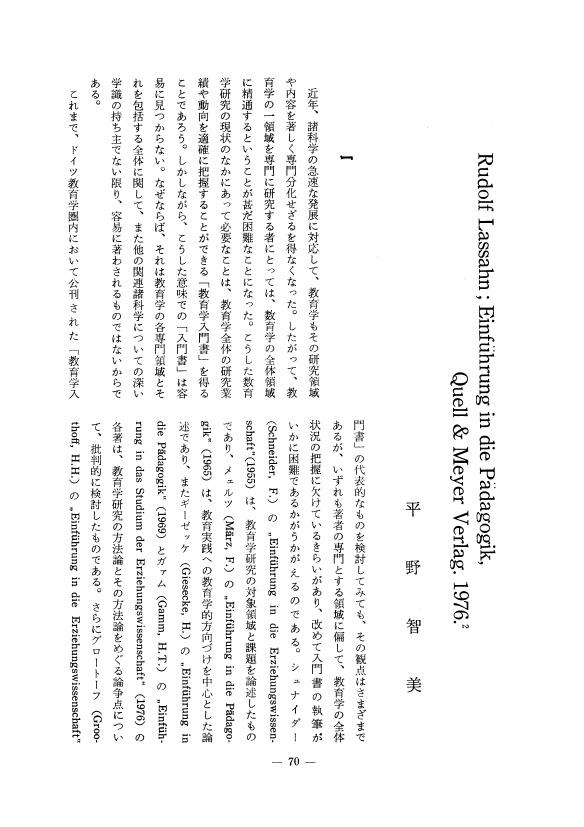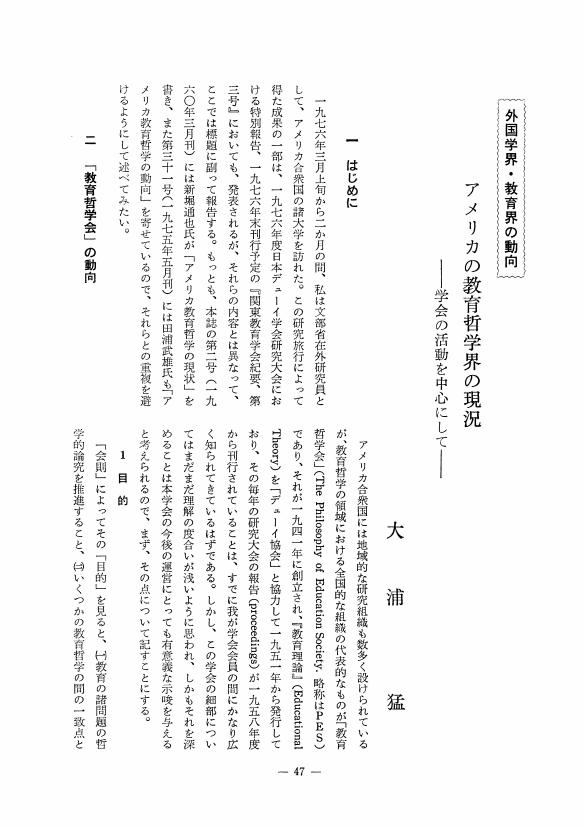1 0 0 0 OA W・クラフキー『批判的構成的教育科学の視点(アスペクト)-理論・実践・討論の為の論文集』
- 著者
- 小笠原 道雄
- 出版者
- 教育哲学会
- 雑誌
- 教育哲学研究 (ISSN:03873153)
- 巻号頁・発行日
- vol.1977, no.35, pp.79-85, 1977-05-20 (Released:2009-09-04)
1 0 0 0 OA ペスタロッチーの「努力」観 草稿『野蛮と文化について』を中心に
- 著者
- 広瀬 俊雄
- 出版者
- 教育哲学会
- 雑誌
- 教育哲学研究 (ISSN:03873153)
- 巻号頁・発行日
- vol.1977, no.36, pp.35-51, 1977 (Released:2009-09-04)
- 参考文献数
- 83
Über Barbarei und Kultur is an unfinished manuscript and gives the impression of being a continuation of one of Pestalozzi's main works, the Nachforschungen (1797). But despite the fact that it is an unfinished manuscript, it is an important work which cannot be overlooked because it contains many views which may be regarded as further developments of the Nachforschungen. In this paper the author concentrates on Über Barbarei und Kultur and investigates the view of “effort” taken therein. The paper adapts the following plan : Introduction I. Laziness and distorted effortII. True effort. (1) Culture ; (2) Effort towards refinement ; (3) Effort toward development of various faculties III. Incentives and foundations of effort ConclusionAs H. Schonebaum mentions, Pestalozzi considered “effort” very important as some kind of touchstone for the development of the human nature. But what he consi ders as important is not merely effort in the sense of “being fervent, i.e. not being idle in pursuing some task”. It is rather an effort which in addition can be regarded from a viewpoint of value, i.e. an effort toward “moral refinement”. But this “effort” is not something heteronomous, forced on the individual from the outside, but something autonomous and subjective. According to Pestalozzi “the effort toward the development of various faculties” must be the necessary foundation of this “effort”. Furthermore, in Über Barbarei and Kultur he also discusses the problem of “the incentives of effort” and it is interesting to note the view he takes in trying to organize these incentives by using a “technique”, because this view is an important step in his attempt to formulate a “method”.
1 0 0 0 OA 道徳教育への示唆としてのヤスパース哲学 客観的当為から実存的当為へ
- 著者
- 吉村 文男
- 出版者
- 教育哲学会
- 雑誌
- 教育哲学研究 (ISSN:03873153)
- 巻号頁・発行日
- vol.1977, no.36, pp.21-34, 1977 (Released:2009-09-04)
- 参考文献数
- 13
This paper attempts to interpret the views of Jaspers on Sollen, and thus to arrive at a deeper insight into moral education.Jaspers distinguishes the objective Sollen in the common sense from the “Existen tial Sollen”. The former becomes rigid and cannot fulfil a lifelike function. On the other hand, the Existence, in the particular historical situation in which it is located, and when it acts from the necessity of the So-tun-müssen (be forced to act in such a way) turns into the Existential Sollen and the objective Sollen can thus in every situation be grasped anew.From these considerations we can be lead to understand that as long as moral education repeats only an indoctrination of the objective Sollen, it will be nothing but an inculcation of a rigidified Sollen and consequently provoke the pupil's antagonism. Hence, it is important that the self be aroused to re-act to a particular situation unconditionally from a deep and necessary consciousness, and the self thereby be lead to make an objective Sollen its own (aneignen). For this reason the more the teacher tries in earnest to indoctrinate the pupil with the objective Sollen, the more he ends up in the contradiction that the Sollen becomes rigidified ; it becomes necessary, there-fore, that the teacher enters into a communication with the pupil.
1 0 0 0 OA エマソンにおける「児童尊重」の思想 その本質と独自性
- 著者
- 市村 尚久
- 出版者
- 教育哲学会
- 雑誌
- 教育哲学研究 (ISSN:03873153)
- 巻号頁・発行日
- vol.1977, no.36, pp.1-20, 1977 (Released:2009-09-04)
- 参考文献数
- 69
Emerson's transcendentalism requires throughout as ideal image an individual self-content and self-respecting. This claim is strongly reflected also in his view on education (the child), it aims at a point where it becomes a “postulate” of perfect “respect for the child”, and the purpose of this paper is to examine the nature and the basis of that “postulate”. From the fact that Emerson's view of “respect for the child” is quoted extensively as a principle to corroborate Dewey and Parkhurst it my be inferred that these ideas form a starting point of American progressivism and child-centered education.When the “depth” of Emerson's view is examined analytically along the lines of the method of his thinking (“encounter” and “intuition”) in order to clarify the essence and the peculiar character of Emerson's “Respect for the Child”, it turns out that its acme is the world of “reason, i.e. spirit”. This is an understanding of an extremely symbolic (abstract) nature containing at the same time a universal (truth) meaning, hence on the contrary it has been observed that Emerson's postulate of “respect for the child” contains a hidden radical meaning. When one reflects on the underlying reason, the conclusion is that this postulate possesses an ethical character and that the nature (soul) of the “ideal” is typically American.
- 著者
- 平野 智美
- 出版者
- The Japanese Society for the Philosophy of Education
- 雑誌
- 教育哲学研究 (ISSN:03873153)
- 巻号頁・発行日
- vol.1977, no.36, pp.70-73, 1977 (Released:2009-09-04)
1 0 0 0 OA ミュンスター大学教育学科
- 著者
- 平野 智美
- 出版者
- 教育哲学会
- 雑誌
- 教育哲学研究 (ISSN:03873153)
- 巻号頁・発行日
- vol.1977, no.35, pp.70-74, 1977-05-20 (Released:2009-09-04)
1 0 0 0 OA 政治と教育
- 著者
- 金子 光男
- 出版者
- 教育哲学会
- 雑誌
- 教育哲学研究 (ISSN:03873153)
- 巻号頁・発行日
- vol.1977, no.35, pp.9-16, 1977-05-20 (Released:2010-01-22)
- 参考文献数
- 16
1 0 0 0 OA 価値と関係のない教育政策でよいのか 教育学における人間・生態学的次元への出発点
- 著者
- シュライヒャー K
- 出版者
- 教育哲学会
- 雑誌
- 教育哲学研究 (ISSN:03873153)
- 巻号頁・発行日
- vol.1977, no.35, pp.53-69, 1977-05-20 (Released:2010-05-07)
- 参考文献数
- 36
1 0 0 0 OA 教育思想における政治と教育 フランス啓蒙主義を中心に
- 著者
- 原 聡介
- 出版者
- 教育哲学会
- 雑誌
- 教育哲学研究 (ISSN:03873153)
- 巻号頁・発行日
- vol.1977, no.35, pp.25-31, 1977-05-20 (Released:2009-09-04)
1 0 0 0 OA 教育思想における教育と政治
- 著者
- 堀内 守
- 出版者
- 教育哲学会
- 雑誌
- 教育哲学研究 (ISSN:03873153)
- 巻号頁・発行日
- vol.1977, no.35, pp.17-24, 1977-05-20 (Released:2009-09-04)
1 0 0 0 OA 大谷光長著『ケルシェンシュタイナー教育学序説』
- 著者
- 東岸 克好
- 出版者
- 教育哲学会
- 雑誌
- 教育哲学研究 (ISSN:03873153)
- 巻号頁・発行日
- vol.1976, no.34, pp.54-59, 1976-10-10 (Released:2009-09-04)
1 0 0 0 OA 宇佐美寛著『ブロンスン・オルコットの教育思想』
- 著者
- 市村 尚久
- 出版者
- 教育哲学会
- 雑誌
- 教育哲学研究 (ISSN:03873153)
- 巻号頁・発行日
- vol.1976, no.33, pp.81-87, 1976-05-10 (Released:2009-09-04)
- 著者
- 桐田 清秀
- 出版者
- The Japanese Society for the Philosophy of Education
- 雑誌
- 教育哲学研究 (ISSN:03873153)
- 巻号頁・発行日
- vol.1976, no.33, pp.88-93, 1976-05-10 (Released:2009-09-04)
1 0 0 0 OA ルネッサンス・ユートピアンの教育思想
- 著者
- 石井 正司
- 出版者
- 教育哲学会
- 雑誌
- 教育哲学研究 (ISSN:03873153)
- 巻号頁・発行日
- vol.1976, no.34, pp.18-31, 1976-10-10 (Released:2009-09-04)
- 参考文献数
- 30
The purpose of this paper is to investigate the theoretical origins of the intuition didactics of common mass education which are at the center of modern pedagogy and didactics of which Comenius is a typical representative. The view is taken here that the origins are not to be sought in the Renaissance or the Reformation, but rather in the educational thought of the Renaissance utopians ; hence Thomas More, Bacon, Campanella and Andreae have been chosen as four typical representatives whose educational theory will here be examined. There is a great wealth of studies on the educational thought of the Renaissance and the Reformation, but almost nothing has been published so far on the educational thought of the utopians. In fact, their educational theory is not limited to being a source of the intuition didactics of common mass education, but they contain also a wealth of views which are a source of inspiration for solving contemporary problems in education. This paper, therefore, attempts to open up the study of these as yet unexplored educational theories.
1 0 0 0 OA 教育科学における概念形成の諸問題 『教育科学の基礎概念』 (一九七四年) より
- 著者
- ヴォルフガング ブレツィンカ 小笠原 道雄 森川 直
- 出版者
- 教育哲学会
- 雑誌
- 教育哲学研究 (ISSN:03873153)
- 巻号頁・発行日
- vol.1976, no.34, pp.32-46, 1976-10-10 (Released:2009-09-04)
- 参考文献数
- 35
1 0 0 0 OA アメリカの教育哲学界の現況 学会の活動を中心にして
- 著者
- 大浦 猛
- 出版者
- 教育哲学会
- 雑誌
- 教育哲学研究 (ISSN:03873153)
- 巻号頁・発行日
- vol.1976, no.34, pp.47-53, 1976-10-10 (Released:2009-09-04)
1 0 0 0 OA リットにおける自然と人間
- 著者
- 宮野 安治
- 出版者
- 教育哲学会
- 雑誌
- 教育哲学研究 (ISSN:03873153)
- 巻号頁・発行日
- vol.1976, no.33, pp.65-80, 1976-05-10 (Released:2009-09-04)
- 参考文献数
- 22
Theodor Litt is well known as a cultural philosopher and as a cultural educationist, but if we turn to his works published after World War II, we notice that his interest expanded so as to include not only the human and cultural world, but also the world of nature. The purpose of this paper is to clarify the relation between nature and man from the viewpoint of man's “becoming self” (Selbstwerden), and to examine starting on that basis the place of natural science in the so-called formation of man (Menschenbildung).According to Litt, nature confronting man, can be divided into three aspects, “nature as object”, “nature as impression” and “nature as support, ” and correspondingly the relation between nature and man also can take on three different directions. In each we can recognize a certain individualism, hence the meaning of scientific thinking in terms of becoming self is singled out, and as a consequence, it is given a place within the formation of man. Here, Litt's concept of “antinomy” comes forth, replacing his concept of “harmony.”
- 著者
- 伊藤 幸寿
- 出版者
- The Japanese Society for the Philosophy of Education
- 雑誌
- 教育哲学研究 (ISSN:03873153)
- 巻号頁・発行日
- vol.1975, no.32, pp.66-71, 1975-10-10 (Released:2009-09-04)
1 0 0 0 OA Wolfgang Brezinka, Die Pädagogik der Neuen Linken. Suttgart : Seewald Verlag. 2. Aufl. 1973. 66 pp.
- 著者
- クラウス ルーメル
- 出版者
- The Japanese Society for the Philosophy of Education
- 雑誌
- 教育哲学研究 (ISSN:03873153)
- 巻号頁・発行日
- vol.1975, no.32, pp.56-60, 1975-10-10 (Released:2009-09-04)
- 著者
- 庄司 他人男
- 出版者
- The Japanese Society for the Philosophy of Education
- 雑誌
- 教育哲学研究 (ISSN:03873153)
- 巻号頁・発行日
- vol.1975, no.32, pp.61-65, 1975-10-10 (Released:2009-09-04)














